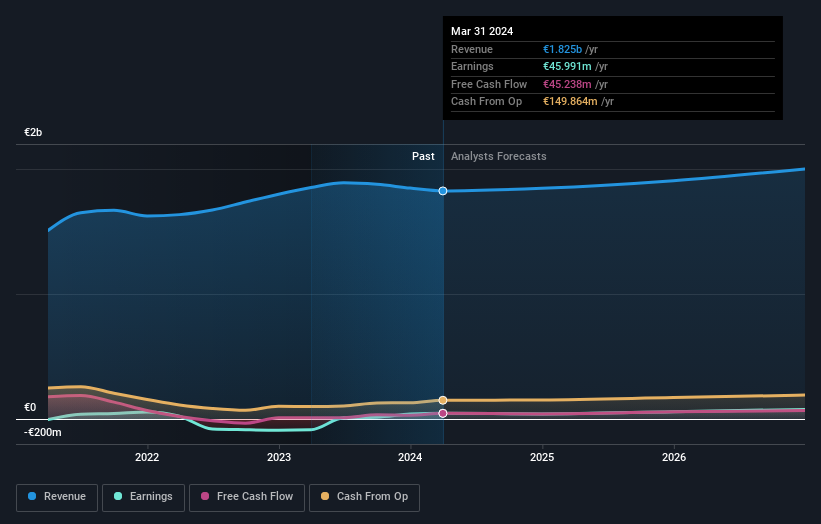Key Insights
-
Significant control over ElringKlinger by retail investors implies that the general public has more power to influence management and governance-related decisions
-
The top 3 shareholders own 52% of the company
A look at the shareholders of ElringKlinger AG (ETR:ZIL2) can tell us which group is most powerful. With 43% stake, retail investors possess the maximum shares in the company. In other words, the group stands to gain the most (or lose the most) from their investment into the company.
Meanwhile, institutions make up 37% of the company’s shareholders. Insiders often own a large chunk of younger, smaller, companies while huge companies tend to have institutions as shareholders.
Let’s delve deeper into each type of owner of ElringKlinger, beginning with the chart below.
Check out our latest analysis for ElringKlinger
What Does The Institutional Ownership Tell Us About ElringKlinger?
Many institutions measure their performance against an index that approximates the local market. So they usually pay more attention to companies that are included in major indices.
ElringKlinger already has institutions on the share registry. Indeed, they own a respectable stake in the company. This suggests some credibility amongst professional investors. But we can’t rely on that fact alone since institutions make bad investments sometimes, just like everyone does. When multiple institutions own a stock, there’s always a risk that they are in a ‘crowded trade’. When such a trade goes wrong, multiple parties may compete to sell stock fast. This risk is higher in a company without a history of growth. You can see ElringKlinger’s historic earnings and revenue below, but keep in mind there’s always more to the story.
Hedge funds don’t have many shares in ElringKlinger. Looking at our data, we can see that the largest shareholder is Paul Lechler Stiftung gGmbH, Endowment Arm with 32% of shares outstanding. The second and third largest shareholders are Elgarta GmbH and Lechler Beteiligungs-Gmbh, with an equal amount of shares to their name at 10%.
To make our study more interesting, we found that the top 3 shareholders have a majority ownership in the company, meaning that they are powerful enough to influence the decisions of the company.
Researching institutional ownership is a good way to gauge and filter a stock’s expected performance. The same can be achieved by studying analyst sentiments. Quite a few analysts cover the stock, so you could look into forecast growth quite easily.
Insider Ownership Of ElringKlinger
The definition of company insiders can be subjective and does vary between jurisdictions. Our data reflects individual insiders, capturing board members at the very least. Company management run the business, but the CEO will answer to the board, even if he or she is a member of it.
Most consider insider ownership a positive because it can indicate the board is well aligned with other shareholders. However, on some occasions too much power is concentrated within this group.
Our data cannot confirm that board members are holding shares personally. Given we are not picking up on insider ownership, we may have missing data. Therefore, it would be interesting to assess the CEO compensation and tenure, here.
General Public Ownership
The general public– including retail investors — own 43% stake in the company, and hence can’t easily be ignored. While this size of ownership may not be enough to sway a policy decision in their favour, they can still make a collective impact on company policies.
Private Company Ownership
We can see that Private Companies own 20%, of the shares on issue. It’s hard to draw any conclusions from this fact alone, so its worth looking into who owns those private companies. Sometimes insiders or other related parties have an interest in shares in a public company through a separate private company.
Next Steps:
While it is well worth considering the different groups that own a company, there are other factors that are even more important. Be aware that ElringKlinger is showing 1 warning sign in our investment analysis , you should know about…
Ultimately the future is most important. You can access this free report on analyst forecasts for the company.
NB: Figures in this article are calculated using data from the last twelve months, which refer to the 12-month period ending on the last date of the month the financial statement is dated. This may not be consistent with full year annual report figures.
Have feedback on this article? Concerned about the content? Get in touch with us directly. Alternatively, email editorial-team (at) simplywallst.com.
This article by Simply Wall St is general in nature. We provide commentary based on historical data and analyst forecasts only using an unbiased methodology and our articles are not intended to be financial advice. It does not constitute a recommendation to buy or sell any stock, and does not take account of your objectives, or your financial situation. We aim to bring you long-term focused analysis driven by fundamental data. Note that our analysis may not factor in the latest price-sensitive company announcements or qualitative material. Simply Wall St has no position in any stocks mentioned.

